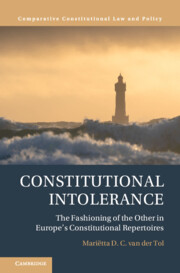Book contents
- Constitutional Intolerance
- Comparative Constitutional Law and Policy
- Constitutional Intolerance
- Copyright page
- Dedication
- Contents
- Acknowledgements
- 1 What Is Constitutional Intolerance?
- 2 Governing Religious Difference
- 3 Toleration, Time, and the Other
- 4 National Identity, Publicness, and Public Space
- 5 Dynamic Interpretation of Constitutional Concepts
- 6 Ad libitum Use of Constitutional Concepts
- 7 Constitutional Identity as a Political Instrument
- 8 Pseudo-constitutional Repertoires
- 9 Conclusion
- Bibliography
- Index
5 - Dynamic Interpretation of Constitutional Concepts
Laïcité in France
Published online by Cambridge University Press: 09 January 2025
- Constitutional Intolerance
- Comparative Constitutional Law and Policy
- Constitutional Intolerance
- Copyright page
- Dedication
- Contents
- Acknowledgements
- 1 What Is Constitutional Intolerance?
- 2 Governing Religious Difference
- 3 Toleration, Time, and the Other
- 4 National Identity, Publicness, and Public Space
- 5 Dynamic Interpretation of Constitutional Concepts
- 6 Ad libitum Use of Constitutional Concepts
- 7 Constitutional Identity as a Political Instrument
- 8 Pseudo-constitutional Repertoires
- 9 Conclusion
- Bibliography
- Index
Summary
This chapter opens a series of chapters with case studies on France, the Netherlands, Hungary, and Poland. The institution of French laïcité is commonly understood as referring to a strict separation of church and state. This chapter explains how laïcité has become entangled in the pseudo-constitutional notion of vivre ensemble and the rising significance of social norms for the substantiation of the legal concept of l’ordre public. This is inferred from two particular expressions of constitutional intolerance: first, the overly general and restrictive prohibition of the full-face veil in public spaces, which culminated in the S.A.S. v. France case. Second, it details the expansion of the legal concept of laïcité as expressed in the 2021 Law Concerning the Respect for the Principles of the Republic, which exercises extensive control over the organisation of religious institutions, sources of funding, and their political loyalty to the Republic.
Keywords
- Type
- Chapter
- Information
- Constitutional IntoleranceThe Fashioning of the Other in Europe's Constitutional Repertoires, pp. 69 - 86Publisher: Cambridge University PressPrint publication year: 2025

